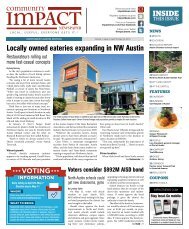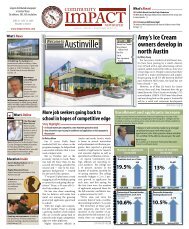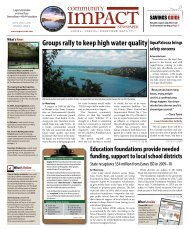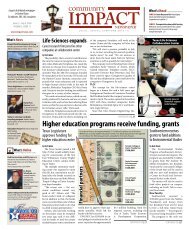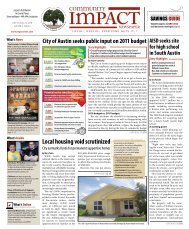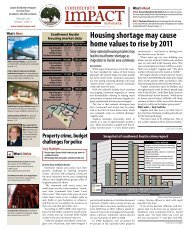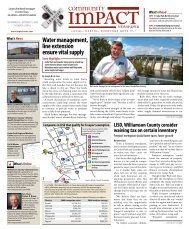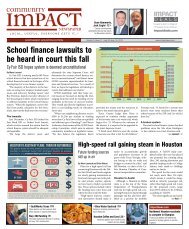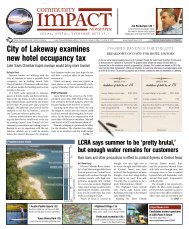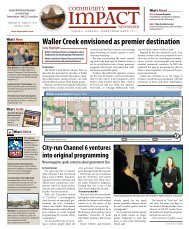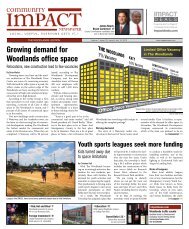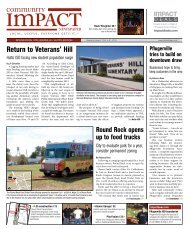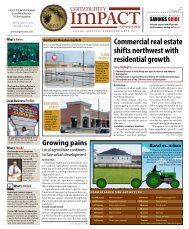Cedar Park & Leander - Community Impact Newspaper
Cedar Park & Leander - Community Impact Newspaper
Cedar Park & Leander - Community Impact Newspaper
Create successful ePaper yourself
Turn your PDF publications into a flip-book with our unique Google optimized e-Paper software.
News Report | Austin Regional Intelligence Center<br />
By Kelsey Wilkinson<br />
Local police say Austin has<br />
more than 2,000 active gang<br />
members, and the city’s proximity<br />
to the drug trade along the<br />
Mexican border caused the U.S.<br />
Drug Enforcement Administration<br />
recently to designate Austin<br />
as a High Intensity Drug Trafficking<br />
Area.<br />
“My sense, as<br />
I talk to police,<br />
is that Austin<br />
has changed<br />
rapidly in the<br />
last 20 years,”<br />
said Michael<br />
Lauderdale, a<br />
criminal justice<br />
professor<br />
at The University<br />
of Texas<br />
and chair of the<br />
city’s public safety commission.<br />
“Austin is much, much larger. It<br />
has acquired serious problems in<br />
terms of drugs in the community<br />
and people engaged in moving<br />
those drugs.”<br />
The fear that drug-related violence<br />
could make its way to Austin<br />
is the key component that<br />
influenced Lauderdale to support<br />
the city’s decision to establish<br />
the Austin Regional Intelligence<br />
Center, also known as the<br />
fusion center.<br />
Information fused<br />
The ARIC aims to prevent the<br />
spread of that caliber of crime and<br />
violence through data collection<br />
and analysis. Operating under<br />
the umbrella of the Department<br />
of Homeland Security, it shares<br />
data with local, state and federal<br />
law enforcement agencies.<br />
Lauderdale said a fusion center<br />
would be crucial in situations<br />
where law enforcement agencies<br />
from different jurisdictions work<br />
separately to solve crimes that<br />
“If a fusion center was set<br />
up, the flow of data would<br />
happen more quickly.<br />
Ordinarily, without a fusion<br />
center, it would take weeks<br />
to pull that data together.”<br />
Learn from<br />
the past<br />
may be committed by the same<br />
perpetrators—for instance, similar<br />
burglaries that occur across<br />
city or county lines.<br />
“If a fusion center was set up,<br />
the flow of data would happen<br />
more quickly,” Lauderdale said.<br />
“Ordinarily, without a fusion<br />
center, it would take weeks to<br />
pull that data<br />
together.”<br />
Local law<br />
e n f o r c e m e n t<br />
began pursuing<br />
a fusion center<br />
in 2008 when<br />
Travis County<br />
received Urban<br />
Area Security<br />
Initiative status<br />
by the DHS. The<br />
status identifies<br />
counties with<br />
significant security issues and<br />
enables them to apply for Homeland<br />
Security funds. In August<br />
2009 the Austin City Council,<br />
with those funds, approved the<br />
center, which will be located in<br />
a Department of Public Safety<br />
building in north Austin. The<br />
council will vote on the final<br />
details of the center in late May.<br />
The center is not yet operating,<br />
but by as early as midsummer it<br />
will be one of more than 70 working<br />
fusion centers across the country<br />
collecting data from financial,<br />
health care, retail, energy, electronic<br />
and education sectors.<br />
Data overload<br />
The breadth and ambiguity<br />
of the center’s jurisdiction combined<br />
with the amount, type and<br />
speed of the data collected has<br />
some groups worried.<br />
“We can do all kinds of guessing<br />
about what information<br />
could impact public safety,” said<br />
Chuck Young, founder of Texans<br />
for Accountable Government, a<br />
—Michael Lauderdale<br />
Criminal justice professor,<br />
University of Texas<br />
Confidential<br />
In an effort to produce an intelligence center with<br />
a good reputation, Austin Police Department Chief<br />
of Staff David Carter said Austin is looking to other<br />
centers to learn best practices. To view a draft of the<br />
fusion center’s privacy policy, visit<br />
more.impactnews.com/8002.<br />
Operation goals for Austin Regional Intelligence Center:<br />
• Establish a strong relationship with law enforcement partners<br />
• Strive for public support with strong privacy<br />
policy and government transparency<br />
• Develop and become a national model for<br />
efficient and effective training techniques<br />
for employees<br />
MAP<br />
• Obtain strong executive leadership<br />
W. Koening Ln.<br />
N<br />
N. Lamar Blvd.<br />
group vocal in its opposition to<br />
the center.<br />
Young addressed the members<br />
of the Public Safety Commission<br />
at its April 5 meeting to express<br />
his concerns over the type of data<br />
allowed to be collected based on<br />
vague wording in the fusion center’s<br />
privacy policy.<br />
“Other agencies used data collected<br />
from things like consumer<br />
cards to track salmonella outbreaks,”<br />
Young said. “But I don’t<br />
think it’s appropriate to channel<br />
that type of data through a<br />
fusion center.”<br />
While Lauderdale supports the<br />
establishment of the ARIC, he<br />
remains cautious about how data<br />
that runs through the center is<br />
collected and dissected.<br />
“If I assume you are a member<br />
of a Mexican drug cartel because<br />
you drink Corona instead of Budweiser,<br />
that’s obviously an abuse<br />
of the data,” Lauderdale said.<br />
Part of the public safety commission’s<br />
job will be to monitor<br />
and assess the center’s operations<br />
and how its data is analyzed.<br />
Classified?<br />
“[The fusion center] is not in<br />
operation yet, so it hasn’t actively<br />
violated any civil liberties,” said<br />
Matt Simpson, a policy strategist<br />
for American Civil Liberties<br />
Union of Texas. “The concern<br />
isn’t that the policies themselves<br />
will violate our constitutional<br />
civil liberties; it’s more of a concern<br />
of the actors themselves.”<br />
Once data is collected, local<br />
law enforcement is then left<br />
with the task of determining<br />
how the data is analyzed and<br />
who gets to see it. Other fusion<br />
centers have already established<br />
a record of coercion and<br />
discrimination on the part of law<br />
enforcement officials, said.<br />
“Sometimes people think the<br />
Fusion centers in Texas<br />
fusion center is an investigative<br />
center, but it’s not. It’s an analysis<br />
center,” said David Carter,<br />
Austin Police Department Chief<br />
of Staff. “The people who will be<br />
in the center are primarily crime<br />
analysts who aren’t necessarily<br />
police officers.”<br />
Carter said individuals<br />
involved with analyzing data will<br />
receive specialized training, and<br />
police officers who want access<br />
to the information will have to<br />
demonstrate that they have a significant<br />
right to obtain it based<br />
on an investigation.<br />
“Even that information will<br />
<strong>Community</strong> <strong>Impact</strong> <strong>Newspaper</strong> • impactnews.com May 2010 | 33<br />
Intelligence center’s participating agencies<br />
Federal, state and local agencies will collect, analyze and share information<br />
obtained through the Austin Regional Intelligence Center with the goal of<br />
preventing crime and terrorism in Central Texas. The Austin center would be<br />
one of more than 70 fusion centers nationwide.<br />
Williamson County<br />
Sheriff’s Office<br />
San Marcos Police<br />
department<br />
Federal agencies<br />
Georgetown Police<br />
department<br />
Texas Fusion Center<br />
Managed by the state’s Intelligence and<br />
Counterterrorism Division, this fusion center supports<br />
criminal investigation across Texas. Participating<br />
agencies include the Texas Department of Criminal<br />
Justice, Texas <strong>Park</strong>s and Wildlife Department,<br />
Department of Homeland Security, Department<br />
of the Treasury, Federal Bureau of Investigation,<br />
Drug Enforcement Administration, Immigration<br />
and Customs Enforcement, and the Air and Army<br />
National Guard. Visit www.txdps.state.tx.us/<br />
IntelligenceCounterTerrorism.<br />
North Central Texas Fusion System<br />
The Dallas fusion center began operations in<br />
February 2006 and shares information across a<br />
16-county region in the metroplex. Visit<br />
www.fusionsystem.us.<br />
Houston Regional Intelligence Service Center<br />
Located in the Houston Emergency Center, the<br />
Houston fusion center shares information with other<br />
police departments in the greater Houston area.<br />
Hays County<br />
Sheriff’s Office<br />
Round Rock Police<br />
department<br />
AUSTIN REGIONAL<br />
INTELLIGENCE<br />
CENTER<br />
Police Report<br />
AISd<br />
Travis County<br />
Sheriff’s Office<br />
State agencies<br />
Pflugerville Police<br />
department<br />
University of Texas<br />
Police department<br />
Austin Police<br />
department<br />
Source:<br />
Austin Police<br />
Department<br />
be tracked by the center to make<br />
sure it is valid,” he said.<br />
Weighing the risk<br />
Despite a public that seems<br />
inclined to root against the fusion<br />
center, the city is proceeding with<br />
its plans—a verdict based on the<br />
idea that not to is risky.<br />
“The majority of Austin gang<br />
members are at street level,”<br />
Carter said, as opposed to organized<br />
crime rings. “But we do<br />
know that when crime groups are<br />
looking for folks to be involved<br />
in trafficking, they reach out to<br />
groups such as that.”<br />
Thomas Ruocco, assistant<br />
director of criminal investigations<br />
for the Texas Department of<br />
Public Safety, said Austin could<br />
experience an increase in drug<br />
crime in the future.<br />
Until the center can be observed<br />
in action, the city and some of its<br />
groups may remain divided.<br />
“Any time we talk about police<br />
work, and criminal types of<br />
things, and national intelligence,<br />
there is a pendulum,” Lauderdale<br />
said. “One side is crime control,<br />
and all of us want to be free of<br />
crime. But one of the things associated<br />
with controlling crime is<br />
the gathering of current and historical<br />
information.”



